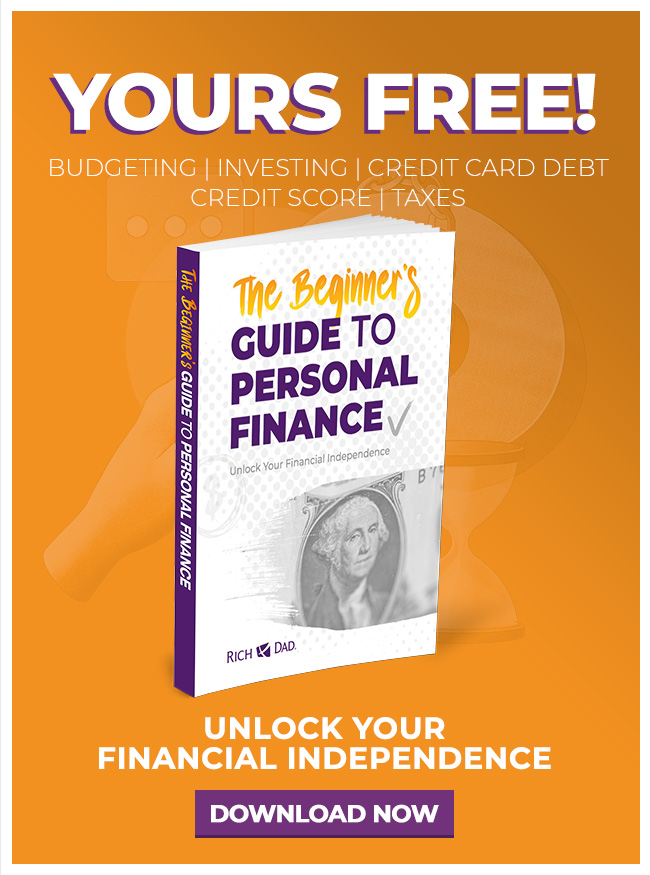“Do you ever wonder how rich people go broke?” That is the fundamental question of financial planner, John MacGregor’s, new book, “The Top 10 Reasons the Rich Go Broke: Powerful Stories that will Transform Your Financial Life…Forever. And it’s perhaps one of the most important questions you can ask yourself… if you want to be rich and stay rich.
If you’ve read any of Robert Kiyosaki’s work before, you know he’s not a fan of financial advisors. They are most often uneducated and hoping to sell you a financial company’s products. John is not a financial advisor, he is a Certified Financial Planner (CFP). Financial advisors are like bookkeepers. CFPs are like CPAs, Certified Public Accountants.
Error: Campaign not found.
A professional financial planner provides more services than simply buying and selling stocks. Real financial planners know about life planning and estate planning. If you don’t want your family fighting over your estate — or the government taking it all — you need a good CFP, and John is just that. In fact, he is so good, he mentors and trains other CFPs.
After decades of experience as a financial planner and thousands of clients, no one is better positioned to share the stories of how the rich go broke.
Financial planning through stories?
One of the reasons that John’s book is so important is because it’s not a textbook. It’s a storybook, and we learn best from stories.
And perhaps more importantly, it’s not a storybook about success. No, it’s a storybook about failure— big, colossal failures. It’s full of horrific stories from real rich people who lost it all, and the lessons you can learn and apply to your own life to make sure you don’t make the same mistakes.
As John writes in the book, “Success stories are easy. And cheap. There are plenty of them out there, but where real learning occurs is in the mistakes people make, the errors and stumbles and falls they took, because that gives us more clarity on what to avoid. When we recognize some of those same mistakes in our own lives, in our own patterns – if we’re being honest with ourselves – we can learn, shift, and adjust as needed to avoid the same pitfalls and traps.”
Why Luke and Sue went broke
Besides stories from his own life, John shares 10 powerful and life-changing stories of failure—of the rich going broke—in his book. One story is about Luke and Sue (John changes the names to protect the not-so-innocent).
Like many people, Luke had an undying faith in his employer and his security as an employee. And things were looking up for him. After moving to San Diego with his wife, Sue, for a well-earned promotion and a salary of nearly $500 million, plus stocks, bonuses, and a generous company-funded pension.
Luke, and especially Sue, had an eye for the finer things in life. And before long they were overleveraged, having bought two condos and a house, as well as all the trappings needed to furnish it. By the time they became John’s clients, they were living nearly paycheck to paycheck, not an easy thing to accomplish when you make over $40,000 a month. Not $4,000 a month, $40,000.
Still, they were relatively well positioned for retirement with Luke’s stock options, his company pension, and their conservative-to-moderate investment approach. But they wanted more. They needed some financial planning.
This was the 1990s and the tech stock boom was exploding. Luke and Sue wanted in. John was hesitant because he knew that when things looked too good to be true, they usually were. These were companies with no real assets and horrible ROI, but their stocks were a rocket ship. It looked and smelled like a bubble (and it was).
This was also the time when self-investing options were on the rise, and when John said he wouldn’t help advise them on tech stocks, they disregarded his advice and did DIY investing, putting nearly their entire savings into tech stocks…and when the bubble popped they lost it all.
To make matters worse, when 9/11 hit, Luke’s company really struggled. He eventually lost his job, his stocks were worthless, and his pension was dissolved. He had nothing.
Luke and Sue and The B.E.A.R. Trap
In hindsight, the story of Luke and Sue seems painfully obvious. It’s tempting to think you would never make the mistakes they did, but the reality is that the allure of a market bubble is hard to resist—especially if you don’t have a high financial IQ.
Financial planning and the B.E.A.R. Trap.
B – Beliefs, the fundamental thoughts that form the basis of all we do. These are almost completely subconscious. As Johns writes, “Our beliefs are our framework for how we think and act. But our beliefs aren’t reality; they’re our opinions of what we believe to be true. These opinions closely determine our actions.”
E – Excuses, the things we verbalize that stem from our beliefs, such as, “I don’t have enough time.” John writes, “Excuses create a cycle that return you back to your beliefs, no matter how flawed or inaccurate they are, and you rely on your built-in excuses (based on your beliefs) to keep you rooted in the same bad habits.”
A – Actions, the decisions we make based on our beliefs and excuses. With enough time, excuses lead to bad decisions, and these bad decisions are your actions (and yes, inaction is the same as action).
R – Results, the natural outcome of your beliefs, excuses, and actions. The just desserts.
It is helpful to look at Luke and Sue’s story through the B.E.A.R. Trap framework. As John writes:
BELIEFS: My company will take care of me.
EXCUSES: “As long as I have my job, I’ll be just fine.”
ACTIONS: Not planning for the “what-if” scenarios. Taking unnecessary risks, thinking nothing can go wrong.
RESULTS: Realizing that perfect storms do occur and discovering too late that everything you counted on could very well be an illusion.
If any of that sounds familiar to your own line of thinking, it’s time to start thinking about how the story of Luke and Sue can be a cautionary tale for you.
The following are some Rich Dad lessons to draw from the story of Luke and Sue.
Error: Campaign not found.
Be careful who you take financial advice from
Rich dad used to say, “Life and business are team sports.” And anyone who plays sports knows that if you have bad team members, you have a bad team. Sports organizations spend countless hours and untold dollars determining who to bring onto their team for success. You should do the same.
Luke and Sue had a great player on their team in John, but instead of trusting someone who had a great track record and clearly their best interests in mind, they listened to the pop financial media and others with no real track record on how they couldn’t miss out on the tech stock boom.
The result: they lost everything.
If you want to be rich and stay rich, vet everyone you bring onto your team. Don’t listen to anyone who doesn’t have a track record of financial planning excellence and success.
Having lots of money doesn’t make you rich
Simply put, having lots of money doesn’t make you rich. How much you keep and grow your money is what makes you rich.
If you make $40,000 a month like Luke and Sue did, but you also spend $40,000 a month, you are not rich. You are poor.
If you make $40,000 a month and you put most of it into cash flowing assets that then also make you $40,000 a month in passive income, you are most definitely rich. Even if you lost your job, your income would be replaced without you doing anything.
Being an employee is risky
In the post, “Is There Really Such a Thing as Job Security?“, you’ll find the following: “Being an employee is the riskiest thing you can do in today’s economy.” The 36 million claiming unemployment during the coronavirus crisis shows this is in a massively magnified way.
Luke and Sue put undying trust in their employer and they learned a hard lesson. When hard times come, employers will always choose the business over you. This misguided trust led to their financial demise.
Often people say that being an entrepreneur is risky. It’s quite the opposite. Being an employee is risky. Entrepreneurs control their own destiny.
Financial planning 101: Learn the difference between an asset and a liability
Understanding the difference between an asset and a liability is the foundation of financial literacy. Luke and Sue mistook their liabilities for assets, to their own financial demise. They would repeat over and over again to John that they had two condos and a house. The problem is that they didn’t understand that your house is not an asset.
Simply put, an asset is something that puts money in your pocket. A liability is something that takes money out. For Luke and Sue, their condos and home did not have cash flow. They had to come out of pocket each month to keep them. Because they were not paid off, if they missed a payment, the bank would simply take them back. That is a liability.
Error: Campaign not found.
If you want to be rich and stay rich, put your money into assets that provide consistent cash flow. That is true security.
Get yourself a copy of John’s new book, “The Top 10 Reasons the Rich Go Broke: Powerful Stories that will Transform Your Financial Life…Forever” to learn more about choosing a financial planner and how to avoid financial disaster.





